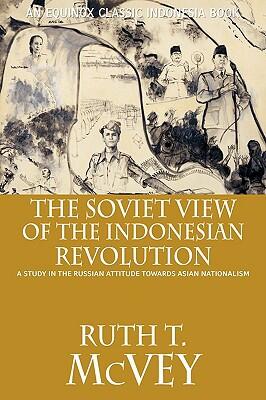
The Soviet View of the Indonesian Revolution: A Study in the Russian Attitude Towards Asian Nationalism
بواسطة
Ruth T. McVey
لا توجد تقييمات بعد
Romance
Action & Adventure
تنسيق
غلاف ورقي
صفحات
104
لغة
الإنجليزية
منشور
Apr 15, 2009
الناشر
Equinox Publishing
رقم ISBN-10
6028397075
رقم ISBN-13
9786028397070
الوصف
Ruth T. McVey delves into the complexities of the Soviet perspective on the Indonesian Revolution, offering a nuanced exploration of how Russian attitudes towards Asian nationalism shaped their political and ideological responses during a crucial period in history. Through meticulous research, she reveals the layers of perception that informed Soviet interactions with Indonesia, underscoring the intersection of Cold War dynamics and decolonization.
With a focus on the shifting geopolitical landscape, McVey highlights the ideological underpinnings that influenced Soviet policy. The narrative illuminates the tensions that arose as Indonesia navigated its path toward independence, while the Soviet Union sought to expand its foothold in Southeast Asia. This analysis uncovers the motivations behind Soviet support for nationalist movements, as well as the hesitations and conflicts that accompanied their involvement.
In analyzing various primary sources, McVey provides readers with a comprehensive view of the Soviet Union's strategic interests in Indonesia. The rich tapestry of historical context fosters an understanding of the interplay between national identity and external influences, revealing the broader implications for other post-colonial nations.
Ultimately, this study serves as a critical lens into the Soviet Union’s engagement with Asian nationalism, reflecting on the complexities of support and intervention. McVey’s work not only contributes to the understanding of Soviet foreign policy but also enriches the discourse on the role of major powers in shaping the destinies of emerging nations.
With a focus on the shifting geopolitical landscape, McVey highlights the ideological underpinnings that influenced Soviet policy. The narrative illuminates the tensions that arose as Indonesia navigated its path toward independence, while the Soviet Union sought to expand its foothold in Southeast Asia. This analysis uncovers the motivations behind Soviet support for nationalist movements, as well as the hesitations and conflicts that accompanied their involvement.
In analyzing various primary sources, McVey provides readers with a comprehensive view of the Soviet Union's strategic interests in Indonesia. The rich tapestry of historical context fosters an understanding of the interplay between national identity and external influences, revealing the broader implications for other post-colonial nations.
Ultimately, this study serves as a critical lens into the Soviet Union’s engagement with Asian nationalism, reflecting on the complexities of support and intervention. McVey’s work not only contributes to the understanding of Soviet foreign policy but also enriches the discourse on the role of major powers in shaping the destinies of emerging nations.